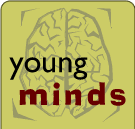| home | our mission | contact us | issue archive |

Feb 2004 / young minds :: email this story to a friend

Learning to Love the Language
By Michelle HatfieldWhen I was little my mom always had books around — to read out loud to my sister and me, as well as just to read for her own pleasure. My dad kept some neat coffee table books with cool pictures and bought us encyclopedias. By the time I started school I had taught myself to read because there was always material around; it seemed like the thing to do if I wanted to grow up. Unfortunately, though, it seems like a lot of kids miss out on this environmental encouragement. Add in those who simply have problems picking up the necessary skills without extra help, and we have a whole bunch of kids who cannot read.
Personal attention generally helps combat this lack of literacy. A couple of hours a week devoted to reading activities outside of school — not with mom and dad or a teacher, but with someone completely different and unbiased — bring up every child's reading level. I have been tutoring for several years with Y-Read, and with each of my learners I have played games, read out loud and silently, and (of course) done workbook pages. The kids enjoy most of these activities, especially if they are tailored to individual interests, and learn to connect reading with fun.
Each reader learns differently, and the program is flexible enough to adapt. The tutors receive a day's worth of training, as well as a binder of information and activity suggestions. After we meet with our students the first time or two we develop an idea of which activities are necessary and would be interesting for our students. With this individual attention, the tutors focus on the needs of their learner, not on what the teacher has to follow from the textbook, because that is what helps the majority of the children. Each child gains more from the two hours than otherwise possible in this way. Over the course of a year the results are astounding.
I have had learners just a grade behind, and one who was entering high school on a fourth grade level. Problems of this nature affect all of a student's subjects, so after spending a year emphasizing her reading all of her grades improve. It is an amazing feeling knowing that you were the one who made a difference in her life so emphatically — now the kids do not make fun of her reading out loud, her teachers will not constantly fail her, and her parents are not always upset with her school performance. The tests done before and after the year reveal how far she has come — a great thing to be able to report to her teachers and her family.
Additionally, the year-long span enables a mentor-like relationship to grow. I have authority, but I am not school or home so it seems less scary. One girl I tutored needed help deciding which Mary-Kate and Ashley haircut was the best. After reading a couple of books we knew which one worked for her. Another boy constantly got in trouble speaking-out at school; he just wanted someone to listen to his side of the story. A journal where he could write his thoughts helped to curb his "bad behavior." Sure, I snuck in literacy activities, but they were ones that helped my learner in multiple ways.
Two hours a week is a big commitment, for me and for my learner. It is two hours I could be knitting or playing Go; two hours he could be playing hockey or watching TV. But it is two hours that help us out in the long run: he gains a vital survival skill, and I get to connect with my community and the youth I find so intriguing. At the annual tutor appreciation banquet when my learner thanks me for tutoring, I know that it has been worth my time, especially when he reads aloud the thoughts he wrote down earlier. Sappy, I know, but important all the same.
If you've got a couple of spare hours a week and would like to help a kid learn to love reading, contact Kathy Adkisson at the Carondelet YMCA — 314.353.4960 x33 or kadkisson@ymcastlouis.org. She'd love to have you.
When she's not tutoring, knitting or playing Go, Michelle Hatfield plays the role of librarian for the St. Louis Public Library.
Church and State | Games | Expatriates | Communities | From the Source
It's All Happening | Young Minds | The Ordinary Eye | Elsewhere
Sights and Sounds | Media Shoegaze | A Day's Work | From the Editor© 2004 The Commonspace
